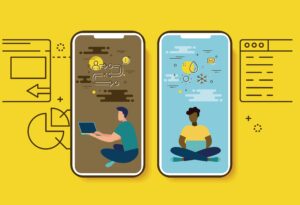As artificial intelligence transforms the world, Michael Chungoyn, a PhD candidate in chemical and biomolecular engineering, doesn’t want public school students to be left behind.
With Nathan Wang ’24, a biomedical engineering major, Chungyoun is developing a hands-on program to integrate AI into classrooms across the United States, beginning this year with high school students in Baltimore City Public Schools.
“Our main motivation is that there are a lot of opportunities for programs like this, but they’re mostly available in private schools and after-school programs,” Chungyoun says.
Hopkins AI in K-12 Education, or HAIKU, is designed to be fun and practical, and foster creativity, its creators say. As students rotate through learning modules that apply AIto history, English, algebra, and biology, Chungyoun hopes they will recognize the value of data-driven thinking across disciplines.
With a $2,500 grant from the Whiting School’s Student Initiatives Fund, Chungyoun and Wang have begun developing HAIKU modules that are relevant to solving real- world problems. Faculty adviser Jonathan Plucker, the Julian C. Stanley Endowed Professor of Talent Development at the Johns Hopkins University School of Education, is helping them stay on a practical track.
“We’re not just going to throw a bunch of theory at students,” Chungyoun says. In one module, students will develop an algorithm to predict weather in a particular ZIP code.Another module produces a football game prediction algorithm. Under development as well is a “Turing test” module that asks students to distinguish between writing prompt responses generated by a classmate and a machine. Also in the works are modules for using AI to predict genome sequencing and fall probability among elderly patients.
The student team will package each HAIKU module as a set of written instructions and a video recording. They plan to make assistance to teachers available in real time to clarify concepts and help teachers become comfortable with the material, Chungyoun says. In addition, high school students will take away “something tangible” from each lesson, such as a predictive weather website or a small sensor they made to measure blood pressure.
In a second phase, HAIKU’s founders plan to develop massive online open courses that introduce AI concepts to high school students without advanced math or programming experience.
A few hurdles remain before HAIKU launches. Chungyoun says additional funding is needed to cover costs, such as stipends for Whiting School students hired to build new modules. In concert with faculty adviser Plucker, Chungyoun also plans a study to evaluate HAIKU’s efficacy.





